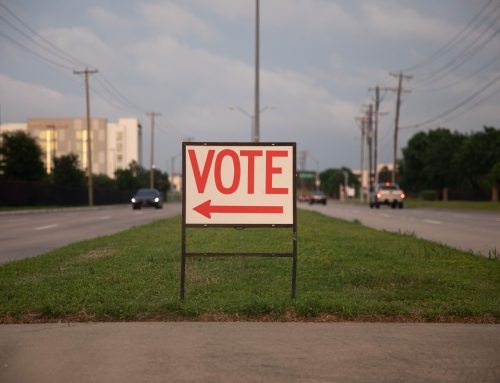Neighborhood political gadfly Avi Adelman became so worked up about the May 7 “strong mayor” vote that he wasted little time crafting a website to broadcast his views. It’s strongarmmayor.com now, but when he was marketing an earlier version of the site, the “s” was a dollar sign.
Adelman’s none-too-subtle point: In the opinion of those opposed, a few well-heeled contributors have thrust the issue onto the city’s political agenda, and they will benefit most if the measure is approved.
Specifically, he and other opponents are upset that (among other things) the proposal was drafted without much citizen input. Attorney and political novice Beth Ann Blackwood hired workers to circulate petitions and obtain enough signatures to place the measure on the May ballot. The petition workers were hired with funds donated by a handful of wealthy contributors, some of who live in the Park Cities and will not be able to vote on it themselves.
“We may need a strong mayor/weak city manager form of government to get Dallas City Hall back on track and working,” Adelman wrote on the site. “But self-serving carpetbaggers with money to burn and their own special interests should not be allowed to strong arm their way into office.
“The Strong-Arm Mayor Proposal gives all the power to the mayor,” he wrote, “and turns our City Council representatives into paperweights.”
Doubtless concerned about that very thing, all 14 members of the current City Council — and many of their predecessors — oppose the measure. The proposal would shift substantial power — such as appointing constituents to city boards and commissions — from the City Council to the mayor.
If voters approve the measure May 7, the city charter also would eliminate the city manager’s job. The mayor would then receive the power to do everything from set city budgets to hire and fire the police chief, along with the rest of the city’s 13,000-member workforce. (See accompanying chart for further breakdown about how the measure would affect certain city government procedure.)
Supporters of the strong mayor proposal, including Mayor Laura Miller, insist the mayor’s office needs more institutional power in order for the city’s top official to make things happen.
But detractors say having so much power in the hands of one official increases the likelihood of political patronage and outright corruption.
“My biggest concern is the loss of checks and balances,” says former City Council member Mary Poss, who lost her race for mayor to Miller. “This proposal will have one person setting the agenda, setting the budget, and doing the hiring and firing. That means one person determines how much will be spent on any particular contract. There are plenty of examples in other cities where this kind of concentration of power has led to corruption.”
Poss, who as a councilman represented East Dallas and Lakewood, says she believes neighborhood interests also would suffer if the measure is approved.
“The budget and the agenda are all determined by the mayor under the new system. If a City Council member is at odds with the mayor, the mayor potentially could refuse to budget something for that council member or put an item for that council member on the agenda.
“That’s exactly why the council members are opposed to this,” Poss says. “Council members worry that if they don’t go along with everything the mayor wants, then their needs for their neighborhood will get neglected.”
Current council members support Coalition for Open Government, which is working to defeat the measure on May 7.
Meanwhile, Miller formed her own interest group, Strong Mayor, Stronger Dallas, which is trying to drum up voter support. And a third group, Citizens for a Strong Mayor, was launched by Blackwood, the lawyer who authored the measure. It is also focused on building voter support.
Both sides in the battle say Miller’s support is a tactical advantage for the supporters of the May 7 measure.
“I have a feeling it may be an up-or-down vote, unfortunately, on the popularity of Mayor Miller,” says Pete Oppel, interim executive director of the Dallas Northeast Chamber of Commerce, which opposes the May 7 measure. “If this was about Mayor Miller and giving her more authority, I would do it. My concern is who’s the mayor going to be 20 years from now?”
Supporters of the ballot initiative say the measure will improve the city’s business climate because the mayor will be able to cut through red tape and bureaucratic hurdles that hamper existing businesses and make suburbs more appealing to companies that are relocating.
But detractors say improving efficiency at City Hall won’t mean much if the only way individual council members can get anything done is by getting the mayor’s blessing.
Business owners in our neighborhood are worried that if the measure is approved, neighborhood council members will lose their clout and the mayor — any mayor — won’t be as responsive to their needs.
“A councilman can go a long way toward getting things through like the City Plan Commission, because they appoint the people who are on the commission” under the existing structure at City Hall, Oppel says.
Under the Blackwood proposal, “a city council member is not going to be able to do those things to help new and emerging businesses or business that want to expand and grow as well as they could,” he says. “That’s my concern, and I think it’s the concern of a lot of our members.”
Many of those who oppose the May 7 proposal say they could support other, less drastic shifts in the balance of power at City Hall.
“People have to say, ‘OK, we realize there’s a problem, but there’s a better way to fix it,”’ Oppel says. “That’s part of the message that opponents of this plan need to come up with.” —Lori Stahl
READ IT
Still wondering what all the fuss is about? The entire strong mayor proposal be found at citizensforastrongmayor.com or strongarmmayor.com.




